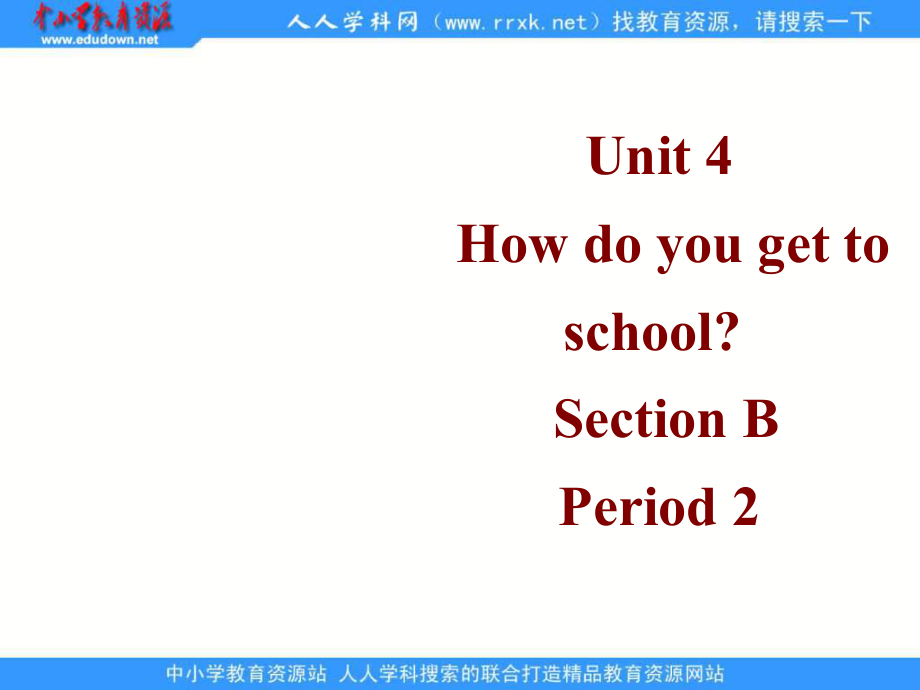《新人教版八上Unit 4How do you go to school(Sectin B)ppt課件2》由會(huì)員分享�,可在線閱讀,更多相關(guān)《新人教版八上Unit 4How do you go to school(Sectin B)ppt課件2(24頁珍藏版)》請(qǐng)?jiān)谘b配圖網(wǎng)上搜索����。
1、 Unit 4 How do you get to school? Section B Period 2cardependillmusttownworry3aHow do students around the world get to school?“T” or “F”.TTF1. In North American, not all students take the bus to school.2. Other parts of the world are different from the United States.3. In Japan, the three most popul
2����、ar ways of getting to school are bus, train and bike.4. In China, bikes and buses are the most popular means of transportation.5. Students in Hongshanhu and Kaishandao have to take a boat to get to school.FT3a In North America, most students go to school on the school bus. Some students also walk or
3�、 ride bikes to school. In other parts of the world, things are different. In Japan, most students take trains to school, although others also walk or ride their bikes. How do students around the world get to school?In China, it depends on where you are. In big cities, students usually ride bikes to
4�、school or take buses. And in places where there are rivers and lakes, like Hongshanhu and Kaishandao, students usually go to school by boat. That must be a lot more fun than taking a bus.1. most students 大多數(shù)的學(xué)生大多數(shù)的學(xué)生 most 前不加冠詞表大多數(shù)前不加冠詞表大多數(shù)如如: 大多數(shù)的學(xué)生走路上學(xué)。大多數(shù)的學(xué)生走路上學(xué)�����。 Most students go to school on foo
5����、t.Explanation2. 交通工具前若有定語交通工具前若有定語,介詞不介詞不能用能用by, 通常用通常用 in 或或 on如:他乘車上班。如:他乘車上班���。He goes to work by car.He goes to work in his car.He goes to work on the bus.3. In other parts of the world, things are different. other; the other; others; the others; another1) other 是形容詞是形容詞, 意思是意思是 “別的別的,其他的其他的” 修飾名詞
6、�。修飾名詞。 We study Chinese, maths and other subjects.2) the other 表示兩者中的表示兩者中的 “另一個(gè)另一個(gè)”, 是是特指特指, 可以接數(shù)詞或名詞復(fù)數(shù)�。可以接數(shù)詞或名詞復(fù)數(shù)�����。 He has two sons, one is a teacher, the other is a worker.3) others 用作代詞用作代詞, 泛指泛指 “其他的人或物其他的人或物” You should think of others.4) the others 特指一個(gè)整體中的特指一個(gè)整體中的 “其余的人其余的人或物或物” There are ten
7�、 flowers on the table. One is red, the other are yellow.5) another 用作形容詞用作形容詞,一般只用于單數(shù)名詞一般只用于單數(shù)名詞前前,且名詞前不用冠詞且名詞前不用冠詞; 也可用作代詞也可用作代詞, 表示表示 “另一個(gè)另一個(gè)”, 用于泛指三者以上的不定數(shù)目用于泛指三者以上的不定數(shù)目的的 “另一個(gè)另一個(gè)” Would you like another cake?4. although 相當(dāng)于相當(dāng)于 though 引導(dǎo)讓步狀引導(dǎo)讓步狀語從句。它不能和語從句�。它不能和but連用����。連用����。如如: 盡管他很高但還是摘不到樹上的盡管他很高但還是摘
8、不到樹上的蘋果�。蘋果。(判斷正誤判斷正誤) Although he is tall, he cant get the apple on the tree. Although he is tall, but he cant get the apple on the tree. 5. In China, it depends on where you are. depend v. 依靠����,依賴依靠,依賴 1) depend(常與(常與on, upon連用)連用) 視情況而定視情況而定 That depends. 視情形而定��。視情形而定�����。2)(常與(常與on 連用)信任����,信賴;需要連用)信任�����,信賴;需
9��、要 I dont have a car, I have to depend on the buses. 我沒有汽車�����,只能靠公共汽車�。我沒有汽車,只能靠公共汽車�。Children must depend on their parents. 孩子們必須依賴他們的父母。孩子們必須依賴他們的父母�。You can depend on his honesty. 你可以相信他的誠(chéng)實(shí)。你可以相信他的誠(chéng)實(shí)����。 depend on 依靠���;由依靠���;由.而定而定, 取決于;從屬于���;取決于�����;從屬于�; 依賴其維持依賴其維持 depend upon 依靠;由依靠�;由.而定而定, 取決于;從屬于取決于�����;從屬于; 依賴其維持依賴
10����、其維持 3b Look at the chat. Then complete the article.How do the students get to Garden High School? How do students get to Garden High SchoolBus walkingBike Subway CarNumber of students401001753050At Garden High School, most students _ to school.Many students _.Some students_.Other students _. A small number of students _. ride their bikesdrivetake the buswalk to schooltake the subway to school
 新人教版八上Unit 4How do you go to school(Sectin B)ppt課件2
新人教版八上Unit 4How do you go to school(Sectin B)ppt課件2

